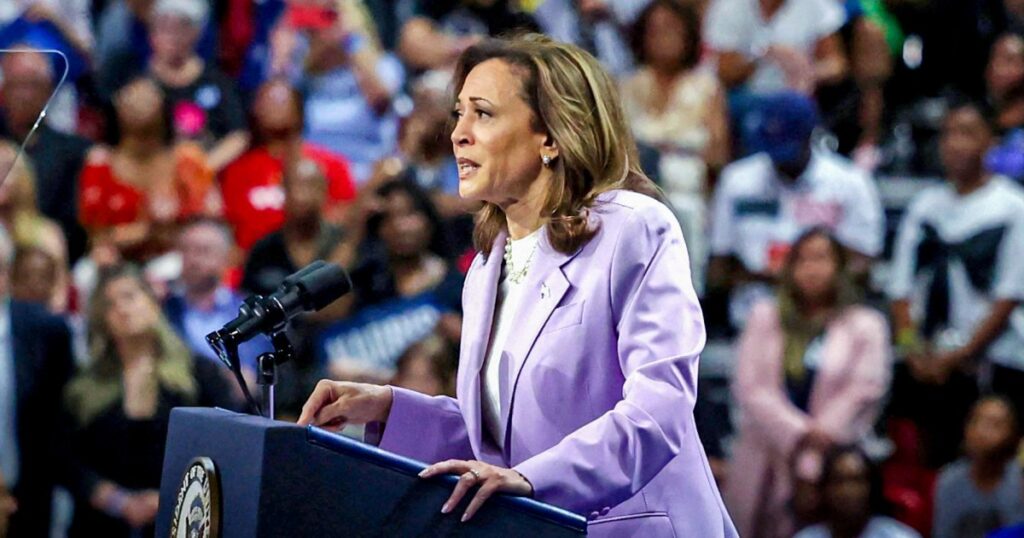Vice President Kamala Harris has bounced back from a slump in Democratic support among Hispanics, according to an Equis Research poll released Wednesday, though her approval rating is currently several points shy of the levels Joe Biden achieved in 2020.
With 80 days to go until the election, Harris is “well on track to halt the Republican surge” among Hispanic voters, according to a polling memo from Equis Research, a Hispanic-focused Democratic pollster.
But a sizable portion of registered Latino voters, many of them new to the race, are still unsure whether they’ll vote or who they’ll support. Where these voters ultimately vote could determine the outcome in several battleground states, pollsters said in notes.
“The vice president has the backing of a wide swath of disaffected Hispanic voters and still has some room to run,” the paper said. “The actions of those final Hispanic voters could determine the overall outcome in battleground states.”
The poll, conducted between July 22 and August 4, showed Harris leading former President Donald Trump by 19 points (56% to 37%) among Hispanic voters in the seven most battleground states: Arizona, Georgia, North Carolina, Nevada, Michigan, Pennsylvania and Wisconsin.
Kamala Harris and Tim Walz attend a campaign rally in Philadelphia on August 6. Joe Lamberti/AP File
This compares to a May 16 to June 6 poll in the same state in which Biden had a five-point lead, 46% to 41%, and these figures came ahead of the June 28 debate in which Biden ultimately dropped out and Harris became the Democratic nominee.
In the 2020 election, Biden received 65% of the vote among Hispanic voters, compared with 32% for Trump, according to exit polls by NBC News. Polls have shown that Trump has eroded the Democratic Party’s lead among Hispanic voters, even though he began his first election campaign in 2016 by denigrating Mexicans. Recent polls suggest that Biden’s poor performance this year could help Trump gain more support among Hispanic voters.
As with other groups, Harris has excited Latino voters, making the race more competitive.
“With Kamala Harris in the running, we are seeing results move back into the historically normal range. Compared to Biden, Harris has seen a rebound in support across Hispanic subgroups, with the biggest rebound among young people,” the pollster said.
Winning the support of young voters
About 44% of the poll’s respondents were under the age of 40. Among those voters, Harris’ support was 17 points higher than Biden’s, 60% to 43%.
She has the support of 59% of Latino women, nine points higher than Biden’s approval rating in early June, and her approval rating among Latino men has risen to 51% for Harris, up from 41% for Biden.
Kamala Harris in Las Vegas on August 10. Rhonda Churchill/AFP – Getty Images
Pollers say Harris’ support isn’t just coming from liberal Latinos, but she is gaining the most from them, beating Biden by 16 percentage points, but she also has 12 percentage points of support from moderate Latinos and 7 percentage points from conservative Latinos.
She has the support of 65% of so-called “double haters” — those who dislike both Biden and Trump — compared with 11% who support Trump. About one in four are either undecided or unlikely to vote.
The survey of 2,183 voters who identify as Hispanic or Latino is the latest in a series of polls conducted from July 22 to August 4 in Arizona, Colorado, Florida, Georgia, Michigan, Nevada, New Mexico, Ohio, Pennsylvania, Texas and Wisconsin. Of the total respondents, 1,242 lived in the battleground states of Arizona, Georgia, North Carolina, Nevada, Michigan, Pennsylvania and Wisconsin.
The margin of error in 12 states is plus or minus 2.9 percentage points, and in seven battleground states it is plus or minus 3.7 percentage points.
Uncertainty Remains in Key Battleground States
Harris is trailing Hispanic voters by several points in battleground states that Biden won in 2020, and her support varies by state.
In Wisconsin, her approval rating is comparable to her 2020 levels. But in Nevada, where polls have shown Biden’s approval rating as a candidate to be one of the biggest drops, her approval rating is five points lower than her 2020 levels.
In Arizona, Harris will likely need the same support Biden had when he won the state by just one point in 2020. She’s two points shy of that, according to a polling memo.
But Hispanic voters, who could decide the outcome in Arizona, Nevada, Wisconsin and Pennsylvania, are not as familiar with daily election news.
They likely won’t be able to decide whether or who they’ll vote for until much closer to the election, Equis said in the memo.
The percentage of undecided Latinos dropped when Harris entered the race, although about 15% of registered Latinos still fall into the persuadable category because they are either “switchers” or “split vipers,” voting for candidates from different parties.
About 9% of those surveyed support Robert F. Kennedy Jr., the lowest percentage of any Equis Research poll, according to the memo. But that, combined with the 30% to 40% of voters who did not vote in 2020, creates uncertainty about the election’s outcome.
Among newly registered voters, Harris leads with 51% to Trump’s 35%, giving her a six-point lead over Biden.
“In some important ways, this race is just getting started,” Eks said.
For more NBC Latino updates, sign up for our weekly newsletter.



